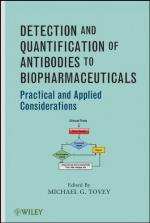|
This section contains 2,331 words (approx. 8 pages at 300 words per page) |

|
Antibodies, or Y-shaped immunoglobulins, are proteins found in the blood that help to fight against foreign substances called antigens. Antigens, which are usually proteins or polysaccharides, stimulate the immune system to produce antibodies. The antibodies inactivate the antigen and help to remove it from the body. While antigens can be the source of infections from pathogenic bacteria and viruses, organic molecules detrimental to the body from internal or environmental sources also act as antigens. Genetic engineering and the use of various mutational mechanisms allow the construction of a vast array of antibodies (each with a unique genetic sequence).
Specific genes for antibodies direct the construction of antigen specific regions of the antibody molecule. Such antigen-specific regions are located at the extremes of the Y-shaped immunglobulin-molecule.
Once the immune system has created an antibody for an antigen whose attack it has survived, it continues to...
|
This section contains 2,331 words (approx. 8 pages at 300 words per page) |

|


